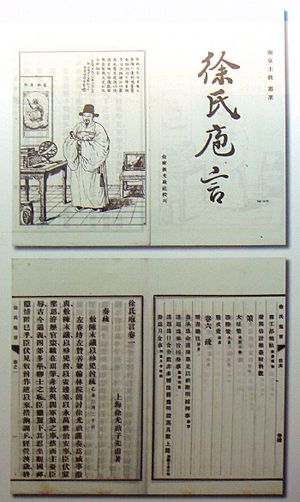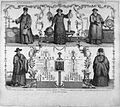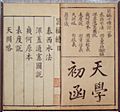Xu Guangqi facts for kids
Quick facts for kids
Xu Guangqi
|
|
|---|---|
| 徐光啓 | |
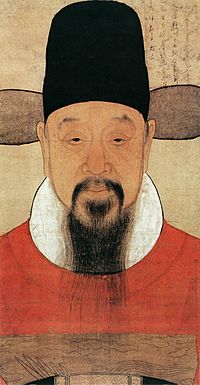
Portrait of Xu Guangqi
|
|
| Vice Minister of Rites | |
| In office 1629–1630 |
|
| Preceded by | Ma Zhiqi |
| Succeeded by | Li Sunchen |
| Grand Secretary of the Wenyuan Library | |
| In office 1632–1633 |
|
| Senior Grand Secretary | Zhou Tingru Wen Tiren |
| Personal details | |
| Born | April 24, 1562 Shanghai County, Songjiang, South Zhili, Ming Empire |
| Died | November 8, 1633 (aged 71) Beijing, Shuntian, North Zhili, Ming Empire |
| Resting place | Guangqi Park, Xujiahui, Xuhui District, Shanghai, China |
| Nationality | Chinese |
| Spouse | Wu |
| Relations | Candida Xu (granddaughter)
(Xu Zhun) (Xu Maheux) |
| Children | Xu Ji (徐驥) |
| Parents | Xu Sicheng (徐思誠), father |
| Education | Jinshi Degree (1604) |
| Occupation | scholar-official (Minister of Rites and Grand Secretary), agronomist, astronomer, mathematician, writer |
| Known for | Three Pillars of Chinese Catholicism Chinese translation of Euclid's Elements Chongzhen calendar Complete Treatise on Agriculture |
| Baptismal name | Paul Xu |
| Xu Guangqi | |||||||||||
|---|---|---|---|---|---|---|---|---|---|---|---|
| Traditional Chinese | 徐光啓 | ||||||||||
| Simplified Chinese | 徐光启 | ||||||||||
|
|||||||||||
| Courtesy name | |||||||||||
| Chinese | 子先 | ||||||||||
|
|||||||||||
| Second alternative Chinese name | |||||||||||
| Chinese | 玄扈 | ||||||||||
|
|||||||||||
| Third alternative Chinese name | |||||||||||
| Traditional Chinese | 保祿 | ||||||||||
| Simplified Chinese | 保禄 | ||||||||||
| Literal meaning | Paulus | ||||||||||
|
|||||||||||
| Servant of God Xu Guangqi |
|
|---|---|
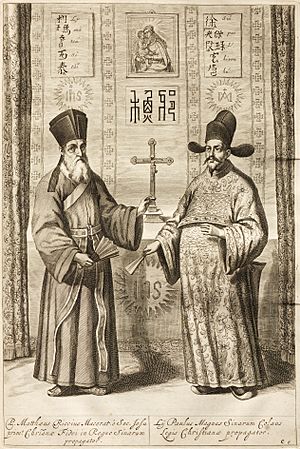
|
|
| Born | April 24, 1562 Shanghai, Ming dynasty China |
| Died | November 8, 1633 Beijing, Ming dynasty China |
Xu Guangqi (born April 24, 1562 – died November 8, 1633) was a very important Chinese scholar during the Ming dynasty. He was known by his baptismal name Paul after he became a Christian. Xu Guangqi was a true polymath, meaning he was skilled in many different areas. He was an expert in farming, a talented astronomer, a brilliant mathematician, a smart politician, and a skilled writer.
Xu Guangqi worked closely with Italian Jesuit missionaries like Matteo Ricci. Together, they translated important Western books into Chinese, including parts of Euclid's famous book on geometry, Elements. He also wrote his own major book about farming called Nong Zheng Quan Shu. The Roman Catholic Church considers him a Servant of God because of his strong faith and contributions.
Contents
Understanding Xu Guangqi's Name
Xu Guangqi's name is written in different ways. The most common way to write it in English is "Xu Guangqi." This is how his name sounds in Mandarin Chinese.
He also had a courtesy name called Zixian and a pen name (a name he used for writing) called Xuanhu. When he became a Christian, he chose the baptismal name Paul. Sometimes, the Jesuits who worked with him called him "Doctor Paul."
Xu Guangqi's Early Life
Xu Guangqi was born in Shanghai, China, on April 24, 1562. At that time, Shanghai was a small county town. His family was not wealthy. His father, Xu Sicheng, had lost much of his family's money when he was young.
To help the family, Xu Guangqi's father worked on a small farm. When Xu Guangqi was six, his family saved enough money to send him to a local school. He also attended a school at the Buddhist monastery at Longhua Temple for a few years.
After his mother passed away in 1592, he spent time mourning her. He tried to pass important government exams but didn't succeed right away.
Xu Guangqi's Career and Contributions
In 1596, Xu Guangqi moved to Xunzhou to help a local official. The next year, he went to Beijing and passed a provincial exam, which was a big step. He then returned to Shanghai and started studying military and farming topics.
Meeting Matteo Ricci
Xu Guangqi met Matteo Ricci, an Italian Jesuit, in Nanjing around 1600. This meeting changed his life. They became close friends and worked together to translate important Western books into Chinese. One of their most famous translations was the first part of Euclid's Elements, a book about mathematics and geometry.
Because of Ricci's influence, Xu Guangqi became a Roman Catholic in 1603. His family continued to be Christians for many generations.
Work in Agriculture
From 1607 to 1610, Xu Guangqi took a break from his government job and returned home to Shanghai. During this time, he experimented with new farming methods, including Western-style irrigation. He also grew new crops like sweet potatoes and cotton.
Later, he returned to government service and rose to a high position. Even then, he kept learning about new farming practices. He encouraged the use of wet-rice farming in Northeast China. He also helped set up self-sufficient military farms in Tianjin.
Military and Government Roles
In 1629, Xu Guangqi convinced the Chinese Emperor to allow Portuguese experts to bring cannons to the capital. He wanted to show how effective Western artillery could be. These cannons were used to train Chinese troops to defend against invaders.
Xu Guangqi held very important government jobs. He was the Minister of Rites, which meant he was in charge of government programs related to culture, education, and foreign affairs. He was also a Deputy Senior Grand Secretary, a high-ranking position in the imperial cabinet.
Xu Guangqi passed away in 1633. A Jesuit named Johann Adam Schall von Bell was with him during his final illness.
Xu Guangqi's Lasting Legacy
Xu Guangqi's tomb is still a central part of Guangqi Park in Shanghai today.
In 1983, China celebrated the 350th anniversary of his death. This showed how important he was to China's history. Many people in China remember him for his desire to improve science, technology, and government. In the West, he is also remembered for his strong Christian faith.
Xu Guangqi's Important Works
Xu Guangqi wrote many important books and papers.
Military Science
He wrote a book called Mr Xu's Amateur Observations about military techniques. He believed in making the country rich and the army strong, an idea that was later adopted by Japan.
Mathematics
In 1607, Xu Guangqi and Matteo Ricci translated the first parts of Euclid's Elements into Chinese. This was a huge step in bringing Western mathematics to China. Some scholars even say he helped start China's "enlightenment" in science.
Astronomy
Xu Guangqi was a skilled astronomer. After he and Ricci correctly predicted a solar eclipse in 1629, the Emperor asked Xu to lead a project to update the Chinese calendar. This project, called the Chongzhen calendar, was the first time European and Chinese scientists worked together on such a large scale. It introduced many new ideas from European mathematics and astronomy to China.
Agriculture
Xu Guangqi wrote a very important book on farming called Complete Treatise on Agriculture. This book was huge, with about 700,000 Chinese characters! He was very interested in helping farmers and improving agriculture in China.
His book covered many topics, including:
- The importance of farming
- How to manage land and fields
- Different farming tasks like tilling
- Methods for controlling water and irrigation equipment
- Tools used in farming
- Growing vegetables and fruits
- Producing silk and other textile crops like cotton
- Forestry and animal care
- Preparing food
- How to deal with famines and help people during hard times
Xu Guangqi's Family
Xu Guangqi had one son, John Xu. John's daughter was Candida Xu (1607–1680). She was a very religious Christian and helped support Christianity in China during her time.
Gallery
See also
 In Spanish: Xu Guangqi para niños
In Spanish: Xu Guangqi para niños
- Xu Guangqi Memorial Hall
- Roman Catholicism in China
- Jesuit China missions
- Three Pillars of Chinese Catholicism
- Shanghainese people
- History of agriculture
- Xavier School in San Juan, Metro Manila, the Philippines
 | Ernest Everett Just |
 | Mary Jackson |
 | Emmett Chappelle |
 | Marie Maynard Daly |


